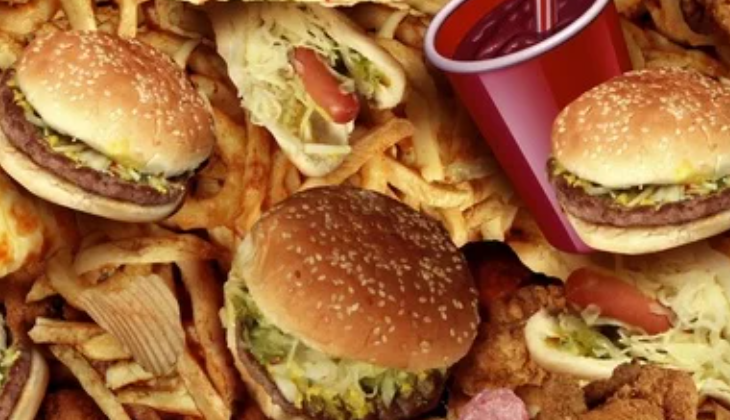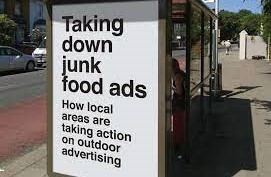Junk food adverts are to banned from bus and taxi shelters and council-owned billboards in Brighton and Hove, after a decision by councillors.
The restriction on advertising food that is high in fat, salt and sugar and energy drinks is expected to take effect in 2025 or 2026 once a current contract has ended.
Brighton and Hove City Council leader Bella Sankey said that the ban was aimed at reducing obesity.
The decision was taken by the council’s Strategy, Finance and City Regeneration Committee at Hove Town Hall on Thursday (7 December).
The committee, made up of senior councillors, agreed to bring in the ban when a new contract is awarded for managing hundreds of bus and taxi shelters in Brighton and Hove.
A report to councillors said that the ban could cost the council almost £150,000 in lost advertising revenue in the first year – and more than £220,000 over the first two years.
The report said: “Public transport budgets contain an income target for bus shelter advertising revenues of £438,000.”
Fast food and energy drinks make up almost a third – and lost revenue could mean cuts in services although, after Transport for London (TFL) banned similar ads, income did not drop significantly.
The report also said: “One in three 11-year-olds leaves primary school already overweight or obese. In some schools in the city this rises to one in two.
“This brings with it a risk of diabetes, many cancers, heart disease, severe covid and other health problems affecting our residents.
“Those children and adults living in more disadvantaged parts of our city have a higher chance of not being a healthy weight and suffering from the health problems that brings.
“Advertising of foods that are high in fat, salt and sugar has been shown to significantly increase purchase and consumption of these items.
“Restricting advertisements for these foods has been recommended as one of a range of evidence-based measures to reduce consumption of high calorie and less healthy food options, reducing the risk of obesity among children and adults.”
The report also said: “The contract for advertising, cleaning and maintenance of bus and taxi shelters is currently managed by Clear Channel on behalf of the council.
“There are 508 bus shelters of which 304 are non-advertising shelters and 204 are advertising shelters – 50 shelter side panels being digital screens.
“In return for advertising space, Clear Channel clean and maintain the shelters and pay an annual concession fee to the council. Income paid by Clear Channel is invested in bus infrastructure and supported bus services in the city.
“The existing contract was last extended in September 2022 due to unstable economic conditions, following the covid pandemic reducing the likelihood of receiving viable tenders, and this temporary contract expires in March 2024.
“It is necessary to retender the contract and to request authority for a further temporary extension while any tender process is carried out.”
The bus and taxi shelter contract extension could last for 18 months – and possibly for two years until March 2026.
The new contract is likely to last for eight years with a possible two-year extension to ensure that the successful bidder can invest in shelters and earn a return on their investment.
The council wants more digital media panels although the report said: “The average roadside digital six-sheet uses approximately 1.5 times the energy of the average UK home (4,500kWhrs) and the roadside digital six-sheet network is now powered down between 12pm to 5am to save energy consumption.
“A requirement for lower-power digital panels will be included in the new tender specification.
“Manufacturers are competing to make ultra-energy efficient screens because this is what the industry wants to buy and recent technology is expected to come with dramatic reductions in power usage.
“Digital panels enable a greater turnover of adverts which operate at six-second intervals. They do not require visits by staff to insert new paper adverts saving on time and resources.”
The council estates team also leases advertising space on billboards at sites across Brighton and Hove.
The new ban will apply only to council-owned advertising sites and the report to councillors noted: “There are numerous advertising sites and displays both on and adjacent to the public highway.
“For example, there are 30 free-standing digital adverting panels which are former BT phone boxes now managed by One Digital. Some are within several metres of a bus shelter.”
Those adverts – and those in shops and other premises – would not be covered by the ban, the report said, and could lead to junk food ads close to bus shelters or council billboards.
This could have the effect of “blunting the impact of the policy on public health”.

Councillor Sankey said: “Advertising is constantly adapting and there are many products that used to be advertised that are no longer permitted.
“It’s important that we make this move to prioritise the health of our residents. Evidence shows the link between junk food advertising and an increase in buying and eating unhealthy foods.
“Restricting what foods can be advertised is just one of a range of measures to help reduce obesity among children and adults in the city.
“This has been successfully introduced elsewhere without a major impact on income as advertisers have diversified their ads and to meet the restrictions.”












Well done
Perhaps double the business rates of fast food shops and ban food delivery companies from advertising as well…
That’s not in the hands of the council but the government who sets the rate poundage and who employs the district valuer who sets the rateable value.
Maybe sort out the bins, the graffiti, and the weeds, instead of trying to control people’s eating habits.
The city looks absolutely disgusting.
So do a lot of the inhabitants!
Banning fast food advertising at bus stops will certainly help to reduce obesity. However if the Labour Council really want to promote good health then further steps need to be considered.
Back in October I was asked by a resident as to whether bus stops could include a sign on their advertising boardings as to where the nearest defibrillators are situated, but was rebuked.
Perhaps this will now be reconsidered ….
So according to Bella “Evidence shows the link between junk food advertising and an increase in buying and eating unhealthy foods” – if it didn’t then companies would stop making adverts.
Whether stopping doing so on bus stops will make any overall effect is questionable, and it’s there any real harm in eating such “bad foods” occasionally?
Will adverts on BT Street Hubs be affected?
In light of the city’s dire financial situation, I hope the effect on advertising income from bus shelters will be monitored and reported.
A very sensible decision
More income lost…….
Yet, the Council choose to use the Traffic Information signs on roads into the city to urge drivers to walk and cycle and download their ‘Betterpoints’ app.
BHCC once again using propaganda – they have a budget for forcefully trying to change people’s travelling habits. Kafkaesque or what!
The council trying to nudge people towards healthier travelling habits is “Kafkaesque” but fast food companies trying to nudge people towards unhealthier eating habits is fine?
The local taxpayer is paying for Council propaganda aimed at the local taxpayer.
Crazy Franz would love it!
Not really. If you have actually read anything from Kafka, you’d recognise that advertising cheap, nutritionally deficient food (that in and of itself is designed to be addictive) to people who obviously/fundamentally don’t know better, is indeed, Kafkaesque.
Everything OK, Mike?
I enjoyed the hypocrisy of his statement as well, Robin
All very laudable in its way but as all these junk foods are promoted on TV, anti-social media platforms and in supermarkets I doubt that banning adverts from bus shelters is really going to make all that much difference…
I’m reminded of the proverb a journey of a thousand miles starts with a single step.
Perhaps the council could enforce the smoking ban in bus shelters. They stink, and are littered with cigarette ends.
Perhaps the council could enforce the smoking ban in bus shelters. They stink, and are littered with cigarette ends.
Have you written to any councillors about this? That would be a good first step if you actually cared or are you just another moaning minnie?
The actual definition in the smoking ban legislation says: “A building is ‘substantially enclosed’ if it has a ceiling or roof, but has an opening in the walls, which is less than half the total area of the walls.
“The area of the opening does not include doors, windows or any other fittings that can be opened or shut.”
Most bus shelters would not pass this test.